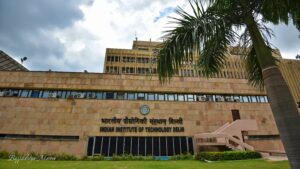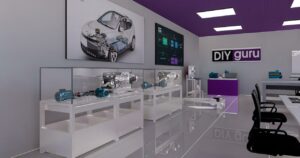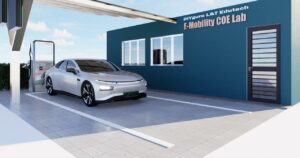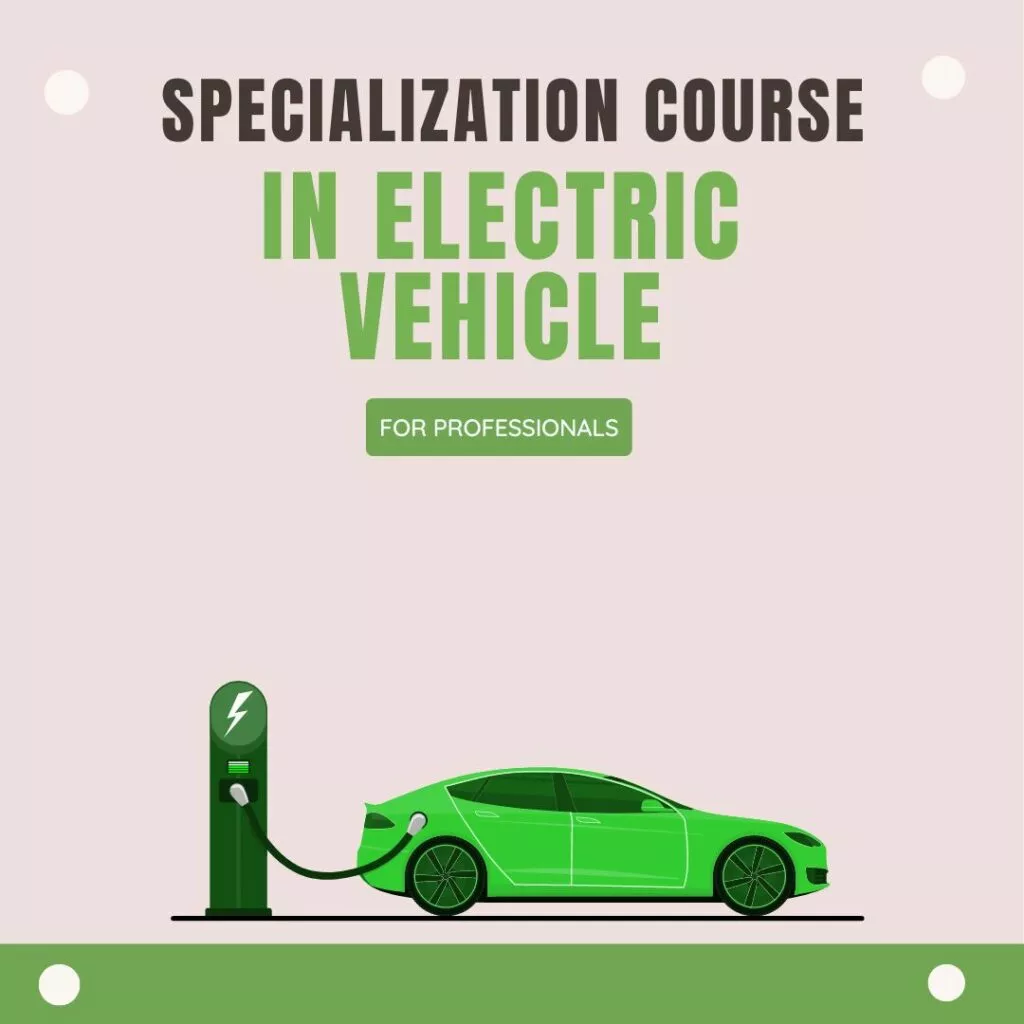(Duration: 2 Months)
1. COURSE INFORMATION
During the two-month duration a candidate is trained on subjects EV Assembly dis-assembly, maintenance, Repair & Safety of EV along with EV Professional Skill, Professional Knowledge, Workshop Calculation Science and Employability Skills related to job role. In addition to this a candidate is entrusted to make/do project work and extra-curricular activities to build up confidence. The practical skills are imparted in simple to complex manner & simultaneously theory subject is taught in the same fashion to apply cognitive knowledge while executing task. The broad components covered under Professional Skill subject are as below:-
The trainee begins with safety aspect in general and specific to the EV trade, identification of tools & equipment, raw materials used. The trainee will perform precision measurements on the components and compare parameters with specifications used in Electric vehicle workshop. He learns to carry out basic fitting operations used in the workshop practices and inspection of dimensions. He learns to inspect the EV component using Non-destructive testing methods. Constructs electrical circuits and performs basic electrical testing in a vehicle. Apply safe working practices and environment regulation in an EV workshop. He identifies the major components of L1, L2, L3,L5 vehicles. Performs the wiring circuits and the electrical components in the vehicle, troubleshoots different wiring circuits in vehicle and prepare different electrical joints. He learns to check and overhaul the EV Powertrain system, service and test battery, inspects BMS & Motor control module and troubleshoot. He identifies and checks ABS components, troubleshoots in all electrical circuits, diagnosis for all comfort system. He also understands the constructional features and working principles of Charging system and different types of sensors in the Electric Vehicle. The trainee identifies DC components, sensors, actuators, major components of EV, automotive lighting system and carries out repair & maintenance.
- TRAINING SYSTEM
- GENERAL
The DIYguru Education and Research (DIYguru) offers a range of vocational training courses catering to the needs of different sectors of future mobility, in particular E-Mobility. The vocational training programmes are delivered under the aegis of DIYguru Institute of Innovation & Research (DIIR). EV Nanodegree with variants for ITI / Diploma & B.Tech. and Electric Vehicle Certified Technician Training Program are two pioneer programmes of DIYguru for strengthening vocational training.
Technician Auto Electrical & Electronics Program under EV Nanodegree is one of the courses delivered nationwide through a network of DIYguru Labs. The course is of two-month duration. It mainly consists of Domain area and Core area. The Domain area (Theory & Practical) imparts professional skills and knowledge, while Core area (Workshop Calculation science, EV Repair & Maintenance and Employability Skills) imparts requisite core skills, knowledge and life skills. After passing out the training program, the trainee is awarded a Certificate by DIYguru which is recognized worldwide.
Candidates need broadly to demonstrate that they are able to:
- Read & interpret technical parameters/document, plan and organize work processes, identify necessary materials and tools;
- Perform task with due consideration to safety rules, accident prevention regulations and environmental protection stipulations;
- Apply professional skill, knowledge, core skills & employability skills while performing jobs and repair & maintenance work.
- Document the technical parameters related to the task undertaken.
- PROGRESSION PATHWAYS
- Can join EV / Automotive industry as Technician and will progress further as Senior Technician, Supervisor and can rise up to the level of Manager.
- Can become an Entrepreneur in the related field.
- Can join Apprenticeship programmes in different types of industries leading to a National Apprenticeship certificate (NAC).
- Can join Crafts Instructor Training Scheme (CITS) in the Program for becoming an instructor in ITIs.
- Can join Advanced Diploma (Vocational) courses under DIYguru as applicable.
- COURSE STRUCTURE
Table below depicts the distribution of training hours across various course elements during a period of two months:-
| S No. | Course Element | Notional Training Hours |
| 1 | Professional Skill (Practical) | 100 |
| 2 | Professional Knowledge (Theory) | 50 |
| 3 | Workshop Calculation & Science | 25 |
| 4 | Employability Skills | 25 |
| Total | 200 |
- ASSESSMENT & CERTIFICATION
The trainee will be tested for his skill, knowledge and attitude during the period of course through formative assessment and at the end of the training program through summative assessment as notified by the DIYguru from time to time.
The Continuous Assessment (Internal) during the period of training will be done by Formative Assessment Method by testing for assessment criteria listed against learning outcomes. The training institute has to maintain individual trainee portfolios as detailed in assessment guidelines.
- ASSESSMENT GUIDELINE
Appropriate arrangements should be made to ensure that there will be no artificial barriers to assessment. The nature of special needs should be taken into account while undertaking the assessment. Due consideration should be given while assessing teamwork, avoidance/reduction of scrap/wastage and disposal of scrap/waste as per procedure, behavioral attitude, sensitivity to the environment and regularity in training. The sensitivity towards OSHE and self-learning attitude are to be considered while assessing competency.
Assessment will be evidence based comprising the following:
- Job carried out in labs/workshop
- Record book/ daily diary
- Answer sheet of assessment
- Viva-voce
- Progress chart
- Attendance and punctuality
- Assignment
- Project work
- JOB ROLE
Electrician, Electric Vehicle; installs, repairs replaces and overhauls wiring, starters, generators, distributors and other electrical equipment of motor vehicles. Examines vehicle battery, checks voltage and specific gravity using special equipment such as voltmeter hydrometer, heavy discharge tester, etc. and ensures that battery is in good condition. Checks vehicle wiring, locates faults and rectifies defects by replacing damaged wire or connecting ends with insulation tape. Starts EV powertrain to check whether BMS is charging correctly, and if Motor, Motor Controller and switches are functioning properly. Estimates nature of defects and reports components to be replaced or repaired. Dismantles and repairs electrical units and components such as Motor, generator, inverter, distributor etc. where required. Replaces repaired kit or unit in vehicle and connects it with battery. Conducts thorough examination of various electrical fittings such as lights, panel indicators, Battery , etc. and rectifies defects. Checks condition and makes necessary adjustments. May do armature winding. May drive vehicles on road. May charge batteries.
- LEARNING OUTCOME
Learning outcomes are a reflection of total competencies of a trainee and assessment will be carried out as per the assessment criteria.
LEARNING OUTCOMES (TRADE SPECIFIC)
- Use different types of tools and work shop equipment in the Auto work shop following safety precautions.
- Perform precision measurements on the components and compare parameters with specifications used in automotive work shop practices.
- Use of different type of fastening and locking devices in a vehicle.
- Perform basic fitting operations used in the work shop practices and inspection of dimensions.
- Produce components using bending process in the given work piece.
- Construct electrical circuits and test its parameters by using electrical measuring instruments.
- Perform basic electrical testing in a Electric Vehicle.
- Perform battery testing and charging operations.
- Construct basic electronic circuits and testing.
- Manufacture components with different types of welding processes in the given job.
- Check & Interpret Vehicle Specification data and VIN, Select & operate various Service Station Equipment’s.
- Identify the major components of L1 to L6 vehicles
- Identify and Check wiring circuits and the electrical components in the vehicle.
- Trace /troubleshoot different wiring circuits in vehicle and prepare different electrical joints.
- Apply appropriate rule and tools for starting and charging system and diagnose & rectify faults.
- Understand the constructional features and working principles of EDC system.
- Inspect power steering control module and troubleshoot in power steering.
- Diagnosis for all comfort system.
- Demonstrate the skill of automotive lighting system and their troubleshooting.
- Troubleshoots in all electrical circuits.






















